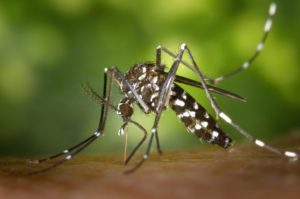 News this weekend of a little boy with brain inflammation after a mosquito bite is a reminder that sometimes mosquito bites can be more than just an annoying welt.
News this weekend of a little boy with brain inflammation after a mosquito bite is a reminder that sometimes mosquito bites can be more than just an annoying welt.
A North Carolina mom’s posting on social media has brought attention to La Crosse Encephalitis, a rare viral brain infection after a certain kind of mosquito bite.
The 6-year-old boy in North Carolina first complained of a headache. The following day, he had a seizure and ended up in the hospital where tests on the fluid around his brain showed La Crosse Encephalitis Virus.
What you need to know about La Crosse Encephalitis Virus
La Crosse Encephalitis Virus is a rare mosquito-related illness that can be seen in certain parts of the United States- mostly the upper midwestern, mid-Atlantic, and southeastern states. According to the Centers for Disease Control (CDC), the states with the most La Crosse Encephalitis activity are Ohio, West Virginia, North Carolina, and Tennessee.
The specific kind of mosquito that causes La Crosse Encephalitis is the eastern treehole mosquito, scientifically known as Aedes triseriatus. Unlike many mosquitos, the eastern treehole mosquito is an aggressive daytime-biting mosquito.
The CDC reminds us that most people with La Crosse Encephalitis don’t show any signs of illness. Mild illness with fever, headache, nausea, vomiting, fatigue and lethargy lasts a few days and can appear 5 to 15 days after a bite from an infected mosquito.
While severe illness is rare, children, and particularly boys, less than 16-years-old, are at the highest risk for severe neurological disease which can include seizures, coma, and paralysis. Death from La Crosse Encephalitis is rare, happening less than 1% of the time according to the CDC.
The CDC says an average of 63 severe La Crosse Encephalitis cases involving the brain and nervous system are reported every year, but the infection is very likely under reported to health authorities.
Anyone who thinks they may have La Crosse Encephalitis should seek prompt medical attention. There is no cure or vaccine for La Crosse Encephalitis, but doctors can provide treatment to help manage seizures and help patients recover safely.
How to protect your family from La Crosse Encephalitis
Preventing mosquito bites and removing mosquito breeding grounds from areas around your home are the best ways to prevent La Crosse Encephalitis and other mosquito-borne diseases.
As its name suggests, the eastern treehole mosquito likes to lay its eggs in tree holes. Filling tree holes with sand or dirt to prevent small pools of water can help contain eastern treehole mosquito populations. The eastern treehole mosquito will also easily lay eggs in man-made containers like cans, buckets, flowerpots, and even in water that collects in discarded tires. Also, don’t forget about standing water in bird baths or pet drinking bowls.
All this is especially important to remember from July to September when infection is most likely to be transmitted to humans from mosquitos.
To prevent mosquito bites, the CDC recommends the use of insect repellent with DEET, picaridin, IR3535 or oil of lemon eucalyptus on exposed skin. Click here for CDC Mosquito Bite Prevention information.
Covering up with long sleeves and pants can also help reduce the risk of mosquito bites. Families can also treat clothing with permethrin, which can even last through several washing cycles.
Click here for more information from the CDC about La Crosse Encephalitis visit.
